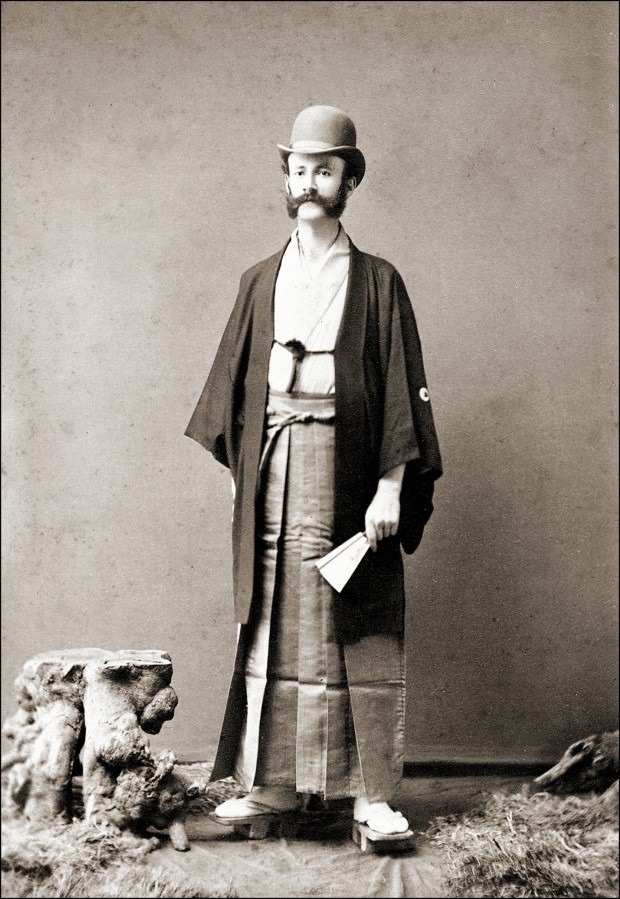 Over the past couple of years I’ve noticed a curious new practice in stores when I use my credit card: I often must produce another piece of identification to demonstrate that the credit card is mine. Continue reading ““Can I See Your ID?””
Over the past couple of years I’ve noticed a curious new practice in stores when I use my credit card: I often must produce another piece of identification to demonstrate that the credit card is mine. Continue reading ““Can I See Your ID?””
In Place/Out of Place
 As I recall Bruce Lincoln remarking in Authority: Construction and Corrosion, if you want to see how systems of authority work, then you need to study them when they break down (as he did in the case of one of former President Reagan’s interrupted speeches); for we can’t usually see them when they’re functioning properly, since we take them for granted as part of the landscape. Continue reading “In Place/Out of Place”
As I recall Bruce Lincoln remarking in Authority: Construction and Corrosion, if you want to see how systems of authority work, then you need to study them when they break down (as he did in the case of one of former President Reagan’s interrupted speeches); for we can’t usually see them when they’re functioning properly, since we take them for granted as part of the landscape. Continue reading “In Place/Out of Place”
Crocodile Tears
 Food Channel viewers in the U.S. will know the popular celebrity cook Paula Deen and the controversy, that hit the media about a month ago, over past racially-charged statements that she confirmed making in a court deposition. One of the things that interests me about this episode is the media response, especially speculations on whether the tears she shed in a morning talk show interview were real or fake — i.e., were sincere (making her apology legitimate and heart-felt) or staged (and thus a manipulative attempt to, I don’t know, save some of her business contracts by resuscitating her public image). Continue reading “Crocodile Tears”
Food Channel viewers in the U.S. will know the popular celebrity cook Paula Deen and the controversy, that hit the media about a month ago, over past racially-charged statements that she confirmed making in a court deposition. One of the things that interests me about this episode is the media response, especially speculations on whether the tears she shed in a morning talk show interview were real or fake — i.e., were sincere (making her apology legitimate and heart-felt) or staged (and thus a manipulative attempt to, I don’t know, save some of her business contracts by resuscitating her public image). Continue reading “Crocodile Tears”
“Where There is Dirt There is System”
 If, as so many scholars now think to be the case, the participant’s self-representation is crucial to take into account when studying human behavior, then I’d hazard a guess that coal miners, while working underground, do not consider themselves to be dirty — at least not until they break for lunch or end their long shift in the dark. Continue reading ““Where There is Dirt There is System””
If, as so many scholars now think to be the case, the participant’s self-representation is crucial to take into account when studying human behavior, then I’d hazard a guess that coal miners, while working underground, do not consider themselves to be dirty — at least not until they break for lunch or end their long shift in the dark. Continue reading ““Where There is Dirt There is System””
Everything Old is New Again
Did you see this article posted at National Public Radio’s site? The Facebook post about the audio story read:

Sometimes the only option that remains in the endless effort to maintain relevance in a changing world is to resuscitate something old, such that reviving a style once judged outdated can, ironically, be seen as innovative.
Finding the Edges of a World Without End

If my previous post made any sense then scholars ought to cease looking for meaning, identity, or significance in the objects studied (like the holiness of the altar or debating which Muslim is the proper sort of Muslim). Rather than doing interpretive, let alone normative, studies we’ll instead examine the usually taken-for-granted systems that groups of people use to make sense of their world–to make the world as it happens to be into a manageable world that, if done “properly,” more than likely appears to all of us as if it always has been that way and therefore ought to continue being that way. Continue reading “Finding the Edges of a World Without End”
Mythologies
 There are few more relevant books for those interested in how systems of representation — in the most mundane and thus often unnoticed places — enable historical happenstance to be portrayed/perceived as timeless necessity than Roland Barthes‘s (d. 1980) classic collection, Mythologies. Originally published in the newspaper as brief commentaries on popular French culture, the short chapters have appended to them a lenghty theoretical essay, “Myth Today,” in which Barthes explains his approach to studying the multi-layered semiotic systems that we routinely see in daily life. In many ways, Mythologies, and the companion collection, The Eiffel Tower, model in their brevity but theoretical consequence what blog posts such as this site aspire to.
There are few more relevant books for those interested in how systems of representation — in the most mundane and thus often unnoticed places — enable historical happenstance to be portrayed/perceived as timeless necessity than Roland Barthes‘s (d. 1980) classic collection, Mythologies. Originally published in the newspaper as brief commentaries on popular French culture, the short chapters have appended to them a lenghty theoretical essay, “Myth Today,” in which Barthes explains his approach to studying the multi-layered semiotic systems that we routinely see in daily life. In many ways, Mythologies, and the companion collection, The Eiffel Tower, model in their brevity but theoretical consequence what blog posts such as this site aspire to.
I’ve Got Your Number
 A quick post in honor of our site’s Curator, who is currently seeing the sites/sights in Greece with Vaia, a member of Culture on the Edge: above is Andie on the victor’s podium at the white marble Panathenaic Stadium — (re)built for the first modern Olympic games, in 1896, on the remains of an 4th century BCE stadium that hosted what we consider to be the ancient games. Continue reading “I’ve Got Your Number”
A quick post in honor of our site’s Curator, who is currently seeing the sites/sights in Greece with Vaia, a member of Culture on the Edge: above is Andie on the victor’s podium at the white marble Panathenaic Stadium — (re)built for the first modern Olympic games, in 1896, on the remains of an 4th century BCE stadium that hosted what we consider to be the ancient games. Continue reading “I’ve Got Your Number”
The C-Word
 There’s been a fair bit of news stories not just about what went on in Egypt the other day but, more specifically, about the U.S. reaction to what went on in Egypt the other day. With around $1.5 billion in annual U.S. foreign aide on the line (second only to its aide to Israel), the reaction is curiously (or predictably? — now that’s a good question!) focused, at least for the time being, on what to classify — and thereby how to understand and react to — what just happened. Sure, an Egyptian general stepped in front of a camera, the duly elected (though now widely unpopular) President was deposed and detained, a number of his party’s senior leadership were also detained, the Constitution was suspended, and military officers swore in its own pick as interim President.
There’s been a fair bit of news stories not just about what went on in Egypt the other day but, more specifically, about the U.S. reaction to what went on in Egypt the other day. With around $1.5 billion in annual U.S. foreign aide on the line (second only to its aide to Israel), the reaction is curiously (or predictably? — now that’s a good question!) focused, at least for the time being, on what to classify — and thereby how to understand and react to — what just happened. Sure, an Egyptian general stepped in front of a camera, the duly elected (though now widely unpopular) President was deposed and detained, a number of his party’s senior leadership were also detained, the Constitution was suspended, and military officers swore in its own pick as interim President.
It looks an awful lot like a coup and it sure smells like a coup, yes — but is it a coup? Continue reading “The C-Word”
Our Primary Expertise
 When I was a doctoral student, sometime in the late 1980s, I recall Will Oxtoby (d. 2003) — then a professor at the University of Toronto, member of my doctoral supervisory committee and, a few years later, editor of a very popular two volume world religions textbook — saying that theory was like a snowblower (using a suitably northern analogy to make his point); “it helps you to move things around,” he said. Continue reading “Our Primary Expertise”
When I was a doctoral student, sometime in the late 1980s, I recall Will Oxtoby (d. 2003) — then a professor at the University of Toronto, member of my doctoral supervisory committee and, a few years later, editor of a very popular two volume world religions textbook — saying that theory was like a snowblower (using a suitably northern analogy to make his point); “it helps you to move things around,” he said. Continue reading “Our Primary Expertise”
